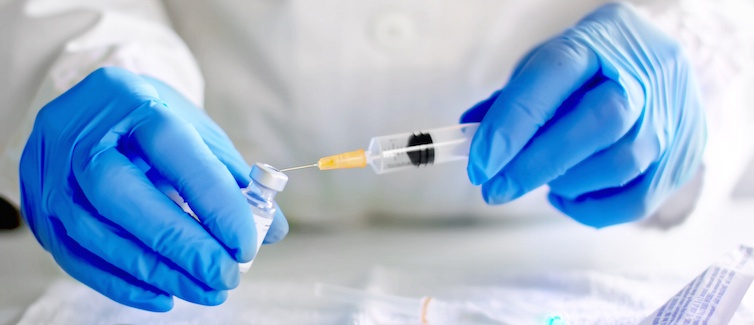Disclaimer: At UPMC HealthBeat, we strive to provide the most up-to-date facts in our stories when we publish them. We also make updates to our content as information changes. However, education about COVID-19 can shift quickly based on new data, emerging variants, or other factors. The information in this story was accurate as of its publish date. We also encourage you to visit other reliable websites for updated information, including the Centers for Disease Control and Prevention (CDC), Food and Drug Administration (FDA), and your state and local governments.
Vaccination is one of the biggest ways to prevent SARS-CoV-2 infection or severe illness with COVID-19. But should people get the vaccine if they currently have a COVID-19 infection or they already had COVID-19?
Can I Get the Vaccine If I Have COVID-19?
If you currently have COVID-19, you should wait until you are no longer contagious and feel well enough to get a vaccine. This is true whether you’re symptomatic or asymptomatic.
According to the Centers for Disease Control and Prevention (CDC), people with symptoms can end their isolation if they meet the following conditions:
- At least five full days have passed since symptoms began.
- Their fever has gone away for at least 24 hours without the use of fever-reducing drugs.
- Other symptoms have improved.
If you have COVID-19 without symptoms, you can end your isolation at least five full days after your first positive test.
While in isolation, you should stay home and should wear a mask when around others.
Once you meet the above criteria for ending isolation, you can get the COVID-19 vaccine. That’s true whether you get infected before your first dose of the vaccine, or if you get infected between doses of the vaccines. Talk to your doctor for more information.
Never Miss a Beat!
Subscribe to Our HealthBeat Newsletter!
Thank you for subscribing!
You can now select the specific newsletters you'd like to receive.
You are already subscribed.
Subscribe to more newsletters in our email preference center.
Sorry, an error occurred. Please try again later.
Get Healthy Tips Sent to Your Phone!
Can I Get the Vaccine If I Was Exposed to COVID-19?
If you have a known exposure to COVID-19, you should wait until you meet the criteria for ending quarantine before getting the vaccine. That typically means staying home for at least five days and monitoring yourself for symptoms for at least 10 days.
Once you meet the conditions for ending quarantine and haven’t developed an infection, you can get the vaccine.
Can I Get Vaccinated If I Had COVID-19 Before?
Yes.
There is no evidence that getting the vaccine will cause negative effects in people who have had COVID-19. If you previously had a COVID-19 infection and have since recovered, you can get the vaccine.
Do I Need to Get Vaccinated If I Had COVID-19 Before?
Yes.
Although having COVID-19 and recovering will provide some amount of protection against reinfection, that protection isn’t permanent. You should still get the COVID-19 vaccine.
Recovering from COVID-19 does provide some short-term immunity. You may consider deferring your vaccination if you recently recovered from COVID-19. Talk to your doctor about that decision.
For more information about COVID-19 and vaccination, visit UPMC.com/COVIDVaccine.
Editor's Note: This article was originally published on , and was last reviewed on .
Sources
Centers for Disease Control and Prevention, Interim Clinical Considerations for Use of mRNA COVID-19 Vaccines Currently Authorized in the United States. Link
Centers for Disease Control and Prevention, Discontinuation of Isolation for Persons with COVID-19 Not in Healthcare Settings. Link
Centers for Disease Control and Prevention, COVID-19: When to Quarantine. Link
About UPMC
Headquartered in Pittsburgh, UPMC is a world-renowned health care provider and insurer. We operate 40 hospitals and 800 doctors’ offices and outpatient centers, with locations throughout Pennsylvania, Maryland, New York, West Virginia, and internationally. We employ 4,900 physicians, and we are leaders in clinical care, groundbreaking research, and treatment breakthroughs. U.S. News & World Report consistently ranks UPMC Presbyterian Shadyside as one of the nation’s best hospitals in many specialties and ranks UPMC Children’s Hospital of Pittsburgh on its Honor Roll of America’s Best Children’s Hospitals. We are dedicated to providing Life Changing Medicine to our communities.
